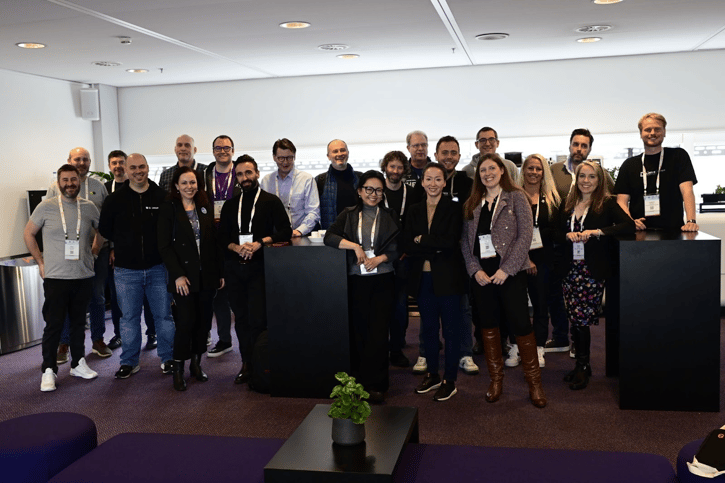Key Takeaways from Inaugural LF Europe Advisory Board Meeting
Linux Foundation Europe | 24 May 2023
Brussels, Belgium– Last month, Linux Foundation Europe was delighted to announce the formation of our LF Europe Advisory Board (LFEAB), which will play an important role in stewarding our growing community, which now spans 100 member organisations from across Europe. In this blog post, we highlight some of the key takeaways from our inaugural meeting and shed light on our priorities going forward.

Inaugural LFEAB meeting at Kubecon + CloudNativeCon Europe 2023 in April 2023
Recap: Introducing the LF Europe Advisory Board
We were excited to announce the members of the LFEAB just a few weeks ago, including representatives from a cross-section of 20 leading European organisations within the EU, the UK, and beyond, with a shared vision for open source collaboration.
"Open source in this time and age is not only critical to the success of technology companies, but to the very business of traditional industries undergoing digital transformation. That’s why I’m thrilled the LF Europe Advisory Board includes such a broad representation from different verticals, companies of all sizes, and from over 10 countries in Europe. Their collective vision and active commitment will maximise the impact and alignment of our open collaborations with European values and priorities"
– Gabriele Columbro, General Manager of Linux Foundation Europe
As per its charter, the LFEAB will have a broad set of responsibilities, which includes providing guidance for LF Europe to engage with the public sector regarding project participation, as well as in response to critical legislation impacting the technology ecosystem – a current example being the Cyber Resilience Act (CRA), AI Act, Digital Services and Digital Markets Act.
Highlights from the Inaugural LFEAB Meeting
We hosted our inaugural LFEAB meeting on the fringes of Kubecon + CloudNativeCon Europe 2023 in Amsterdam in April 2023. With several important topics on the agenda, the meeting provided valuable insights and opportunities for collaboration.
Governance of the LFEAB
The LFEAB will operate as an advisory board, focusing on collaboration and advice rather than governing decisions, as per its charter. The plan is to eventually transition to a more representative LFEAB in 2024. This transition aims to strike a balance between community interests and strategic advisors, ensuring a broader spectrum of perspectives and expertise.
Our Progress So Far
The launch of LF Europe received an overwhelming positive response from the press, highlighting the need for enhanced collaboration among open source stakeholders in Europe, from individuals and civil society to the public and private sectors. We are proud to already count more than 100 participating members and two projects.
We are also placing great importance (and urgency) on the need to amend the EU's Cyber Resilience Act (CRA), which aims to enhance cybersecurity and the security of the software supply chain within the EU. Despite its noble aims, how the Act is currently drafted may unintentionally burden open source contributors and non-profit foundations. The LFEAB will support the visibility of our campaign with other like-minded open source organisations. There is clearly a need for an organisation like LF Europe to organise and communicate the concerns of open source developers to EU policymakers. Join our discord channel to participate in the conversation.
Current Priorities
We aim to establish strong relationships within the European community, extending our scope beyond the EU to include countries such as the United Kingdom and Switzerland. To foster collaboration, we will focus on engaging with European industry, the public sector, and high-potential verticals. The LFEAB is looking to expand its operations through SIGs which can go deeper in exploring these high-potential opportunities; a particularly popular topic is open source AI and vertical collaborations. We’re looking forward to exploring these avenues but if you are an idea for a SIG and / or you’d like to participate or lead one, please reach out to us.
LFEAB members emphasised the important role that impact-driven research will play in pushing the envelope for open source innovation in Europe, from raising awareness of the value of open source amongst public administrators to fostering collaboration on and innovation of emerging technologies like AI. We have now launched the Linux Foundation's World of Open Source: 2023 Global Spotlight survey and we are currently conducting research on OSS developments in the public sector in Europe. The LFEAB will contribute their expertise to our research initiatives and help amplify our actionable insights for the open source community in Europe.
Finally, we plan to continue to grow our membership and our portfolio of projects. We got to introduce our first two projects to the LFEAB (the OpenWallet Foundation and Project Sylva) and the upcoming project launches. We have also shared our efforts in supporting the EU open source agenda by Horizon Europe grant applications for potentially high-impact collaborations with diverse stakeholders, from think tanks to universities. These grants will be a launchpad for exciting, new open source collaborations and, ultimately, for collectively strengthening the digital commons in Europe and beyond. We’re crossing our fingers for successful applications!
About Linux Foundation Europe
The Linux Foundation and Linux Foundation Europe together are supported by more than 3000 members internationally. This expansion highlights the Linux Foundation’s commitment towards growing a truly global, diverse and inclusive institution to continue transparently advancing Open Source growth and to facilitate regional—global collaboration. The Linux Foundation is the world’s leading home for collaboration on open source software, hardware, standards, and data. Linux Foundation projects are critical to the world’s infrastructure including Linux, Kubernetes, Node.js, ONAP, Hyperledger Foundation, PyTorch, RISC-V, and more. Linux Foundation Europe methodology focuses on leveraging best practices and addressing the needs of contributors, users, and solution providers to create sustainable models for open collaboration. For more information, please visit us at linuxfoundation.eu.
